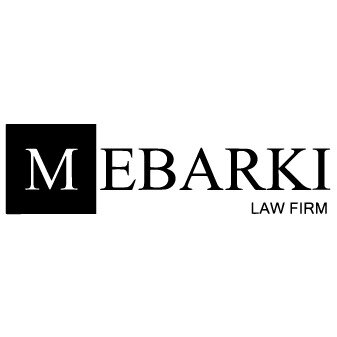Best Employment Benefits & Executive Compensation Lawyers in Algiers
Share your needs with us, get contacted by law firms.
Free. Takes 2 min.
List of the best lawyers in Algiers, Algeria
About Employment Benefits & Executive Compensation Law in Algiers, Algeria
Employment benefits and executive compensation law in Algiers, Algeria, encompasses the regulations and policies governing the remuneration, benefits, and entitlements that employees, especially executives, receive as part of their employment. Given Algeria's complex legal landscape shaped by a blend of Sharia, French civil law, and socialist principles, the employment benefits and executive compensation framework often requires careful navigation to ensure compliance and fair practice. Employers need to be aware of local laws governing wages, bonuses, pensions, healthcare, stock options, and other forms of compensation to avoid disputes and potential legal challenges.
Why You May Need a Lawyer
Legal assistance in the realm of employment benefits and executive compensation can be crucial for several reasons:
- Complex Legal Environment: The interplay of different legal systems in Algeria can make compliance challenging.
- Contractual Negotiations: Ensuring employment contracts meet both parties' expectations and adhere to legal requirements.
- Dispute Resolution: Handling conflicts regarding unpaid benefits, termination disputes, or compensation claims.
- Regulatory Compliance: Staying updated with the latest regulations to ensure lawful employment practices.
- Tax Implications: Navigating the tax consequences of various forms of compensation.
Local Laws Overview
Key aspects of local laws relevant to employment benefits and executive compensation in Algiers include:
- Labor Law: Algerian labor law sets out the minimum standards for wages, hours of work, overtime, leave entitlements, and severance pay.
- Social Security: Employers must contribute to the national social security system, which covers healthcare, pensions, and unemployment insurance.
- Tax Regulations: Compensation benefits are subject to taxation, and understanding local tax obligations is critical for both employers and employees.
- Collective Bargaining: Union agreements can impact benefits and compensation structures, especially in industries with high unionization.
- Anti-Discrimination Laws: Ensures fair treatment in compensation regardless of race, gender, or religion.
Frequently Asked Questions
1. What is the minimum wage in Algiers, Algeria?
The minimum wage is set by the government and is periodically reviewed. It's important to check for current rates as they are subject to change.
2. Are bonuses considered part of an employee's salary?
Bonuses can be considered part of an employee's compensation package but are often separate from the base salary. They may be performance-based or contractual.
3. What types of benefits are mandatory for employers to provide?
Mandatory benefits typically include social security contributions, leave entitlements, and adherence to hours of work regulations.
4. How are executive compensation packages typically structured?
They can include a base salary, performance bonuses, stock options, and other perks, often tailored to the executive's position and company's performance.
5. What legal avenues are available for addressing unpaid compensation?
Employees can file a complaint with the Labor Inspectorate or pursue legal action through the courts to seek unpaid compensation.
6. Are stock options a common form of compensation?
While not as common as in other countries, some multinational companies operating in Algeria may offer stock options as part of executive compensation packages.
7. How do tax laws impact employee benefits?
The taxation of benefits can vary, with certain perks being taxed differently. It's advisable to consult a tax expert for detailed guidance.
8. Can expatriates receive the same benefits as local employees?
This depends on the employment contract and the agreements in place between the employer and the expatriate, as well as any applicable international agreements.
9. What role do unions play in compensation negotiations?
Unions often negotiate collective agreements that can affect wage levels, benefits, and compensation structures for the workforce.
10. How are disputes over executive compensation resolved?
Such disputes can be resolved through negotiation, mediation, or, in some cases, litigation, depending on the nature of the disagreement.
Additional Resources
For further information and support, consider reaching out to the following:
- Ministry of Labor, Employment and Social Security: Offers guidelines and support for employment-related issues.
- National Union Organizations: For understanding collective bargaining agreements and labor rights.
- Local Bar Associations: For finding qualified employment lawyers in Algiers.
- Chambers of Commerce: Can provide resources for businesses navigating employment law.
Next Steps
If you require legal assistance with employment benefits and executive compensation issues, consider the following steps:
- Identify Your Needs: Clearly outline the issues you are facing and the outcomes you desire.
- Consult with Experts: Reach out to legal professionals specializing in employment law to gain insights and guidance.
- Gather Documentation: Collect all relevant employment contracts, communication, and documents for your legal consultant.
- Evaluate Options: Discuss the various legal avenues available to address your issue with your lawyer.
- Take Action: Follow the recommended legal strategy, whether it involves negotiation, litigation, or another approach.
Lawzana helps you find the best lawyers and law firms in Algiers through a curated and pre-screened list of qualified legal professionals. Our platform offers rankings and detailed profiles of attorneys and law firms, allowing you to compare based on practice areas, including Employment Benefits & Executive Compensation, experience, and client feedback.
Each profile includes a description of the firm's areas of practice, client reviews, team members and partners, year of establishment, spoken languages, office locations, contact information, social media presence, and any published articles or resources. Most firms on our platform speak English and are experienced in both local and international legal matters.
Get a quote from top-rated law firms in Algiers, Algeria — quickly, securely, and without unnecessary hassle.
Disclaimer:
The information provided on this page is for general informational purposes only and does not constitute legal advice. While we strive to ensure the accuracy and relevance of the content, legal information may change over time, and interpretations of the law can vary. You should always consult with a qualified legal professional for advice specific to your situation.
We disclaim all liability for actions taken or not taken based on the content of this page. If you believe any information is incorrect or outdated, please contact us, and we will review and update it where appropriate.











